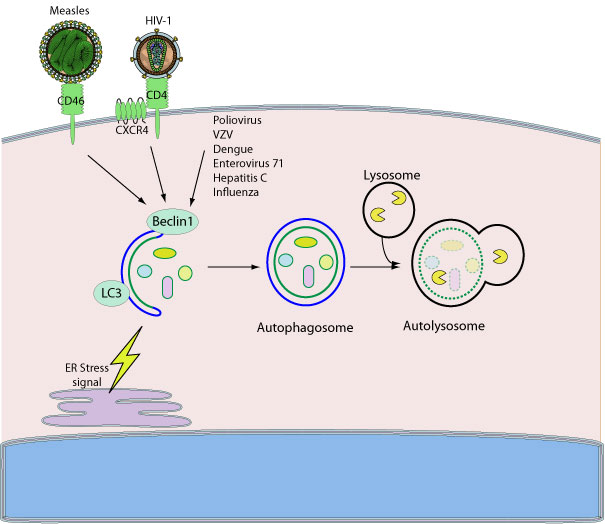Activation of host autophagy by virus (kw:KW-1072)
Autophagy is an evolutionary conserved mechanism for the sequestration and subsequent lysosomal degradation of discrete intracellular portions of eukaryotic cells, facilitating the removal of materials not degraded through the ubiquitin-proteasome pathway. In addition, autophagy plays important roles in innate and adaptive immune responses to pathogens.

Several viruses are able to activate host autophagy as a cellular survival mechanism. Indeed, viruses can activate programmed cell death during infection that prevent them from spreading to healthy tissue. By activating autophagy, viruses delay or inhibit apoptosis. For example, SV40 ST antigen protects cancer cells under glucose deprivation by triggering autophagy. KSHV Rta is able to enhance the autophagic process in order to facilitate viral lytic replication.
Matching UniProtKB/Swiss-Prot entries
(all links/actions below point to uniprot.org website)264 entries grouped by protein
1 entry
ORF3a protein (ORF3a) (Accessory protein 3a) (Protein 3a) (Protein U274) (Protein X1)
6 entries
Envelopment polyprotein (Glycoprotein precursor) (M polyprotein)
47 entries
Non-structural glycoprotein 4 (NSP4) (NCVP5) (NS28)
140 entries
Genome polyprotein
29 entries
Replicase polyprotein 1a (pp1a) (ORF1a polyprotein)
30 entries
Replicase polyprotein 1ab (pp1ab) (ORF1ab polyprotein)
2 entries
Replicase polyprotein 1ab (ORF1ab polyprotein)
4 entries
Inner membrane protein E199L (pE199L)
5 entries
